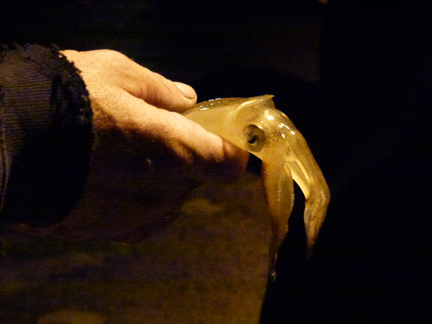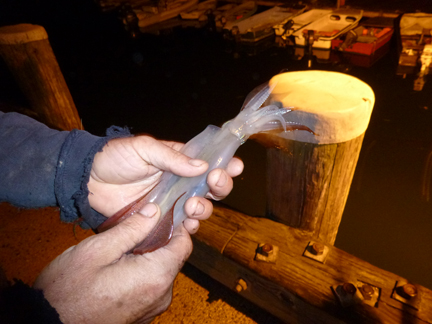
Pale and luminous, the squid drift in a group towards our lures, and then scatter. Their movement is smooth, so different from fish that swim with tail flicks and fins. They slide. Propelled by sucking water and then forcing it out of their body cavity their path is straight and direct, not curving and swaying like a fish. Standing on the pier watching them in the bright lights that shine on the water their silence seems deeper, larger, and more palpable than that of the mackerel that swim nearby.
Catching squid is supposedly easy, but we are not getting any. The lures we bought are heavy, and when we shine our flashlights on them they cast a soft luminous green glow, not unlike the squid itself. The squid come near them, check them out, but are not fooled. We are just so fascinated to see these tentacled creatures stealthily pulsing through the water, always in a pack, that we do not care. We have a picnic: bread and olive oil, sliced cucumbers, molten goat cheese and warm sweet tomatoes from the garden sprinkled with our own sea salt. It is a family outing, and the kids are squid fishing, eating, and chasing each other, while we squid fish and eat. And plot the next squid expedition.
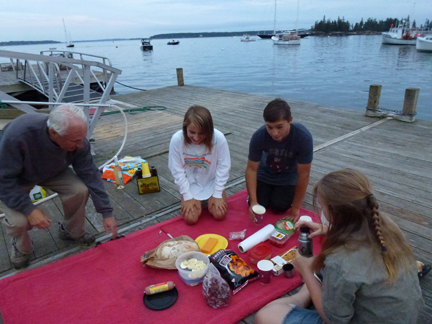
A week later we try again, this time going to Northeast Harbor, two inlets over from Otter Creek. We are surprised to see the dock filled with people, and then astounded at the number of milky squid sliding back and forth in the water below. One young boy is pulling a spinning squid through the air, and his dad gently strokes it and unhooks it, then adds it to their bucket.
We have just encountered Sidney, perhaps thirteen years old, a squid whisperer for sure. One family is just leaving, and say they have caught two squid, but that they watched Sydney, who they call Squidney, pull them in as quickly as he can throw his lure back into the water.
We toss out our heavy lures, and again the squid scatter. Sydney casts his small blue lure and draws it across the surface. He snags a squid, the tentacles spin, spraying water, and he pulls it through the air. Again his dad unhooks, and this time shows us the speckled pattern on the squid’s skin. He remarks that some have a deep red color, while others are pale. As he holds it the color changes. The squid is dying, but he is held with reverence, and it does not seem a cruel passage.
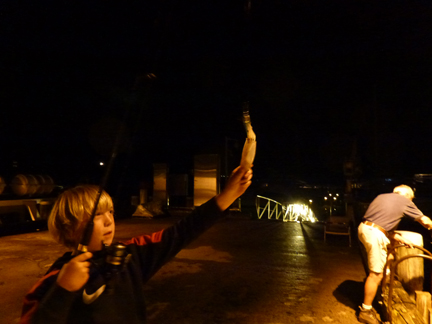
Sydney is happy to share his skills, and shows us his lure, much lighter than ours. I toss mine in, and Sydney gives advice on jigging and how to create movement that will attract the squid. He then he tosses his line back in and thirty seconds later pulls up a squid. Young Sydney is unknowingly modest. He believes I, too, could catch buckets of squid if I had that lure. I am skeptical. I will order some, but I think it is more than the lure, it is Sydney’s skill and dexterity.
His dad agrees. He generously tells us where to get that lure, and then says, “We were both fishing, but Sydney kept catching them, not me, so I just help him.“ It is a lovely father-son partnership. They share a respect and love for squid. Sydney sees a baby squid, and begs his dad to let him catch it and keep it in an aquarium so he can study it. But they do not have an aquarium, and so the baby squid is left alone. They both tell us squid habits, and that squid are smart. “After a while in one spot, the squid tell each other to stay away from our lure, it is taking their brothers away.” I believe. Sydney tells me how they swim in one way when content, and another when looking for food. He has observed them and paid attention.
The father cups Sydney’s most recent catch in his hand and shows us how to clean a squid. The entire time he speaks to us he is stroking the squid, and I reach out and run my fingers along the firm smooth flesh. Yes, I feel love.
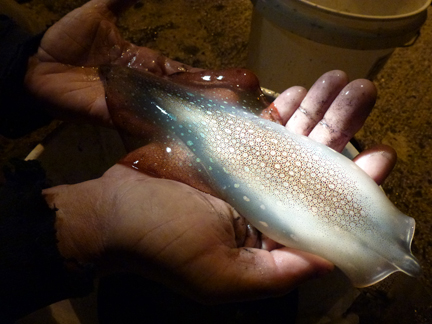
We talk recipes. I am making paella the next night, which is one of the reasons we came to catch squid, and Sydney asks us to please take some of his. We do, and he and his dad know they will be respected. But we are not done. The night is fine, the air calm, and we continue to optimistically toss our clunky lures among the cruising squid, as we watch Sydney pull one after another high through the air.
Then–fast, large, and dark–a wide, fat, seal races into the group of squid. We yank our lures out of the water and a hundred squid explode, shooting two feet above the surface of the water and sending water spray in all directions as they make desperate leaps away from their predator. The light on the erupting water droplets, the shimmer of the colorful skin of the squid–it is finer than Bar Harbor’s Fourth of July fireworks. The seal circles two more times before heading out of the narrow area between the dock and the floats. And the squid return to their calm silent cruising.
We also leave. Sydney’s dad has been suggesting they go home for about half an hour. But the squid are still thick, and as we walk up the ramp to the car we hear Sydney say, “Just one more, please dad?”
